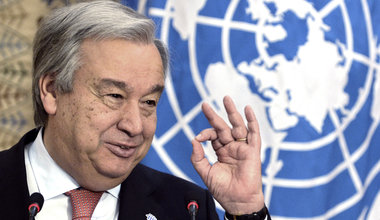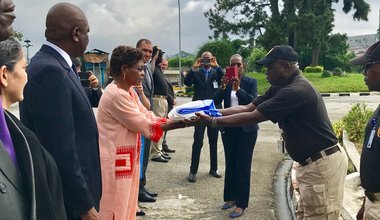National press review for 19 April 2010
The United Nations assessment
Mission visits the ICC
L'Expression -
The United Nations
Assessment Mission was yesterday Sunday 18 April 2010, at the headquarters of
the Integrated Command Center (ICC) in Yamoussoukro. "The ICC gave us a warm
welcome. The chiefs gave us a very detailed and updated report of their
activities. (...) the discussion was very open in order to be able to give a
detailed and precise report to the chief of Mission, Mr. Raisedon Zenenga" said
Mrs. Nanette Hamed, principal officer of the Department of the United Nations
Peacekeeping Operations for West Africa. She explained that she was not
authorized to give more details about the two-hour meeting she held with
Colonel-Major Kouakou Nicolas assisted by his deputy, Colonel Ouattara Karim and
their collaborators to the journalists. While Mr. Zenenga was away, Nanette
Hamed was the chief of the UN delegation in Yamoussoukro with several UN
superior officers. (...)
Crisis-resolution in Côte
d'Ivoire- The UN is worried about the arrival of mercenaries and fighter planes
Le Patriote -
The obstacles facing the
crisis-resolution are still numerous, if we believe the United Nations (UN).
According to a new report, the world organization is worried about the arrival
of "foreign technicians and the repair of one MI-24 and one drone", that is to
say fighters. The UN experts in charge of monitoring the observance of the
embargo on arms to the country have just sent a new report to the Security
Council. It is a mid-mandate report, based on work done from January to March
2010. According to the experts, the obstacles facing the crisis-resolution
process are still numerous and the root causes for the political impasse are
still the same. The experts sent by the Security Council are pessimistic as
regard a quick resolution of the Ivorian crisis. For their part, the political
leaders in the north and the south seem to be unwilling to reunify the country
because they derive political and economic benefit from these divisions. Under
these conditions, the report's authors think that political tensions would
continue, even increase and could result in more requests for arms and military
equipment. There is no evidence that the embargo on arms has been violated, but
the team of experts is worried that foreign technicians are probably back in
Côte d'Ivoire to repair one helicopter MI-24 and one drone. The UN experts are
also deploring the blockage by authorities in Abidjan of access to the equipment
of the Republican Guard or the hesitation by Forces Nouvelles units regarding
the inspection of their armament. In the report, UNOCI's methods of
investigation are also contested because the peacekeepers announce their
inspection 48 hours before. It means that both camps have all the time to
prepare for the visit, according to what they want to show. Finally concerning
countries bordering on Côte d'Ivoire, the investigators note that Burkina Faso,
Mali and Liberia do not take action to stop the traffic in arms, coffee, cocoa,
gold or diamonds.
Election certification by Choi
Fraternité Matin -
a box included
in today's issue of the newspaper is devoted to the issue of certification-
What is the reason for
election certification in Côte D'Ivoire?
The election certification in
Côte d'Ivoire follows a request by the signatories of the Pretoria agreement of
2005 who asked that the United Nations accompany the electoral process in the
crisis-resolution context, with a view to open, free, fair and transparent
elections. In its Paragraph 6, Resolution 1765, adopted in July 2007 by the
United Nations Security Council, entrusts the Special Representative of the
United Nations Secretary-General with the certification mandate. This mandate is
exclusive and personal.
The meaning of election
certification
The certifier is entrusted by
the Security Council to certify that all of the phases of the electoral process
will give the necessary guaranties for the holding of open, free, fair and
transparent presidential and legislative elections, in accordance with
international norms.
The certifier should therefore
make sure that all the necessary guaranties are provided for successful
elections in Côte d'Ivoire. It is a question of safeguarding the process as well
as the results of the election. The certification mandate is a tool which allows
the Ivorian people to organize elections they will be proud of.
Certification criteria
Five framework criteria had
been selected with the agreement of the Ivorian political actors and the
Facilitator: peace, inclusion, state media, the voters' list and the results:
Peace:
The process as well as the results should take place in a peaceful climate
Inclusion:
The electoral process should include all citizens who meet the conditions to be
voters and all persons eligible for candidature.
State Media:
Their impartiality and equal access to all of the candidates, political parties
and groups, should be guaranteed.
The voters' list:
An impartial and non-inclusive list will not be certified. When the voters' list
will be explicitly certified, the Certifier will not allow it to be questioned
retroactively.
The results:
The results of the election will be certified explicitly. When they are
certified, the Certifier will not admit non-democratic contestations or
compromising of the results.
UNOCI heightened Koria's
awareness of human rights.
North South (close to the
Prime Minister) - The United Nations Operation in Côte d'Ivoire (UNOCI), on
Friday, April 16, 2010, heightened the population's awareness on human rights
and a peaceful electoral environment in Koria (510 km north east of Abidjan).
This mission was part of UNOCI Tour, organized by UNOCI to inform residents of
remote communities on its mandate and the peace process and help them contribute
to a peaceful environment.
Presidential Election 2010 /
The reappearance of the Group of Patriots for Peace (GPP). Ultimatum of the
Front for the Safety of the Center West (FSCO) - The safety of the election in
danger.
Nuit et Jour – On last
Thursday, April 15, 2010, the Group of Patriots for Peace (GPP) surrounded the
headquarters of the National Programme for Community Reintegration and
Rehabilitation (PNRCC) for hours to protest against the slow progress in the
reintegration of self-defense groups'. A few months ago, the Front for the
Safety of the Center West (FSCO) led by Marc Bertrand Gnatoa, who claimed to
have more than 50,000 combatants, was the first self-defense group to threaten
to resume its activities if the government continued to marginalize its
elements. (...) In fact, none of these groups - the GPP, the FSCO or even other
militias such as MILOCI, AP-WE, FLGO - have actually been dismantled as people
try to make the populations believe. (...) In 2006, a "disarmament of militias"
ceremony was held in Guiglo in the presence of Mao Glofiéhi, a formidable
militia leader. Several years on, we are realizing that self-defense groups
continue to bother and threaten people. Their presence, without any doubt, is an
impediment to the holding of general elections in Côte d'Ivoire. In reality, as
the people are threatened in their physical integrity by militiamen who do not
hesitate to surround the country's institutions, it is unrealistic to believe
that they will accomplish, in peace and serenity, their civic duty.
 ONU
ONU Nations Unies Maintien de la paix
Nations Unies Maintien de la paix



